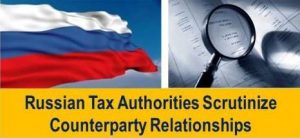 Russian Tax Authorities not only check tax returns. They also check a company’s relationship with counterparties and the method of how a the company authenticates, evaluates and selects business partners
Russian Tax Authorities not only check tax returns. They also check a company’s relationship with counterparties and the method of how a the company authenticates, evaluates and selects business partners
Russian tax authorities examine specific links between counterparties (particularly if one counterparty/its shareholder has shares in another one/others, directly or indirectly, being a link in a chain of affiliated counterparties or a CEO manages several companies in the chain) which can be regarded by tax authorities as willful and fraudulent acts in order to obtain unjustified tax benefit i.e. to evade taxes. Conducting business transactions with a troubled company, or organizing a formal document flow within the chain of linked counterparties, may be defined as methods of tax evasion.
Tax authorities do scrutinize the rational between a tax payer and other counterparties focusing on the following factors:
- Does the choice of a counterparty deviate from previous conditions or business practices?
- Taxpayer’s due diligence on selecting a business partner:
- Terms of transactions and their potential impact on profitability,
- Business reputation and solvency of counterparties,
- Risk of non-performance of obligations by counterparties,
- Availability of necessary and sufficient resources (production facilities, manufacturing equipment, skilled staff) of a business partner and relevant track record in complying with the term of an agreement,
- Has the taxpayer given preferential conditions to counterparties, which do not fulfill their tax obligations
Tax authorities are authorized to request documentation relating to their due diligence when choosing a business partner.
In 2010 and 2015 the FNS issued a number of regulatory documents devoted to a good faith issues particularly in 2010, containing the permission note for companies to apply to future counterparties with the request to provide copies of registration documents, financial accounts etc. “to perform due diligence and exercise caution”.
In addition the FNS has recommended in 2015 to check the legal status and business reputation of counterparties prior to entering into business relationships. However the EGRUL (Unified State Register of Legal Entities) can only confirm the registration and the legal status of a company, but not its business reputation. This means that the due diligence process is not complete. A tax payer is required to move beyond this point and conduct risk assessment.
 To comply with the FNS requirements companies must scrutinize business partners before entering into binding agreements, companies can use the services of the Information and Analytical system Globas-i® https://globas.credinform.ru/ru-RU/home/auth containing information on all companies and sole entrepreneurs registered in Russia. The System helps to implement the compliance and due diligence concepts in practice.
To comply with the FNS requirements companies must scrutinize business partners before entering into binding agreements, companies can use the services of the Information and Analytical system Globas-i® https://globas.credinform.ru/ru-RU/home/auth containing information on all companies and sole entrepreneurs registered in Russia. The System helps to implement the compliance and due diligence concepts in practice.
Background: A letter by the Federal Tax Service of the Russian Federation (FNS) No.ED-5-9/547 “On the Identifying Circumstances of Unjustified Tax Benefit”D as of 23.03.2017 provides recommendations on the implementation of tax control in order to discover facts about receiving of unjustified tax benefit.
The FNS Body devotes much time and attention to good faith issues related to actions of taxpayers. This approach should be taken into account by companies for the purposes of business security when doing business with existing and new counterparties.
Source: Credinform Russia






















